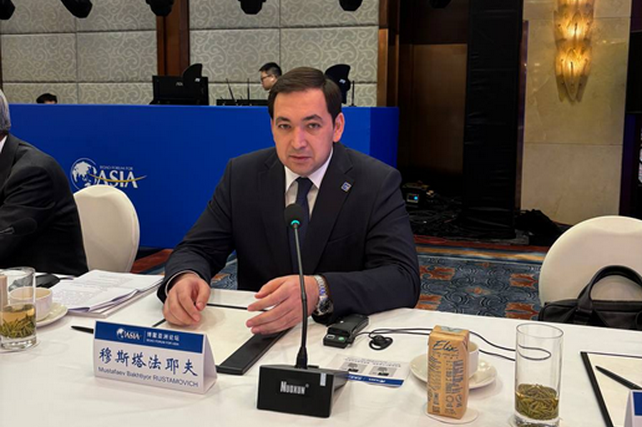
The Future of Asia Discussed in Chengdu: Central Asia as a Model of Successful Transformation
The Future of Asia Discussed in Chengdu: Central Asia as a Model of Successful Transformation
Tashkent, Uzbekistan (UzDaily.com) — On 5–6 November 2025, the annual Academic Conference of the Boao Forum for Asia was held in Chengdu, China.
The event brought together leaders and representatives from leading research and analytical institutions of China, Japan, Indonesia, Malaysia, Cambodia, Thailand, the Philippines, Belgium, Hungary, and Slovenia.
The conference focused on the transformation and strategic development of Asia, strengthening interregional cooperation, and developing new approaches to international engagement.
Bakhtiyor Mustafayev, Deputy Director of the Institute for Strategic and Interregional Studies under the President of Uzbekistan (ISMI), delivered a report on key trends and prospects for the development of Central Asia.
He noted that in recent years, Central Asia has undergone substantial transformation, fundamentally reshaping its image in the international arena. Not long ago, the region was associated with unresolved issues and conflicts, including border disputes, water management, and transport challenges.
Today, thanks to the political will of regional leaders, Central Asia has become a space of trust, good-neighborliness, and mutually beneficial cooperation. Trade and economic cooperation have actively developed, with intra-regional trade volumes increasing nearly fivefold and mutual investments doubling. In 2024, the countries of the region attracted around $25 billion in foreign direct investment, a 27% increase compared to the previous year.
The average GDP growth of Central Asian countries exceeds 5%, higher than the global average. Significant progress has also been made in cross-border infrastructure. “Since 2016, the number of border crossing points between Uzbekistan and neighboring countries has increased by 13, reaching 76. The simplified ID-card-based crossing between Uzbekistan and Kyrgyzstan has become a symbol of new openness and trust in the region,” Mustafayev highlighted.
He emphasized that the increasing internal dynamics and interdependence of the region’s countries make Central Asia one of the most stable and promising areas of the global economy.
As stated by the President of Uzbekistan during the 80th session of the UN General Assembly, “Today, the process of forming a New Central Asia has begun. Thanks to its cohesion, stability, and growing regional identity, it is taking an increasingly firm place in the system of international relations as an independent actor.”
These positive developments have sparked growing interest from external partners, reflected in the creation of new “Central Asia Plus” dialogue formats. More than ten such platforms are now operational, six of which were established in the last five years. Since 2022, several formats—including those with China, the United States, Germany, and the European Union—have been implemented at the level of heads of state, underscoring the region’s rising international authority.
Conference participants agreed that Central Asia is confidently asserting itself as a region capable not only of addressing domestic challenges but also of actively shaping the international agenda, offering new models of integration and cooperation.
Regarding the expansion of international partnerships, participants highlighted Central Asia’s engagement with the Association of Southeast Asian Nations (ASEAN). Both regions share similar approaches—openness, pragmatism, inclusivity, and a commitment to balancing interests. Priority areas include energy and green technologies, digital economy, agriculture, education, and humanitarian exchanges.
In conclusion, the conference underscored that the future of Asia will be defined not by competition between regions, but by the connections among them. Central Asia is transforming from a landlocked, isolated region into a connecting hub, ready to serve as a partner, bridge, and source of ideas for shaping the 21st-century Silk Road—a network of trust, resilience, and innovation linking the heart of Asia with the Pacific.
Background: The Boao Forum for Asia is a non-governmental and non-profit international organization established by 26 countries of Asia and Oceania after the Asian financial crisis to promote dialogue and cooperation in politics, economics, and business.